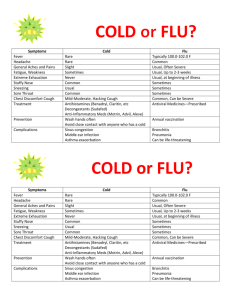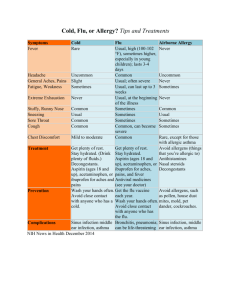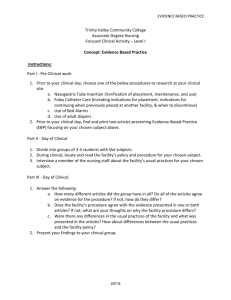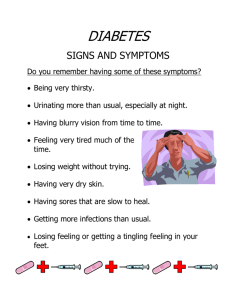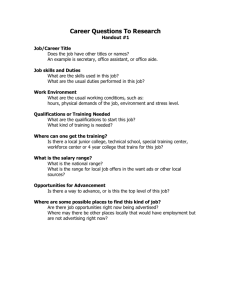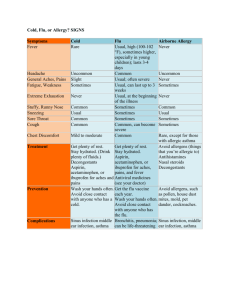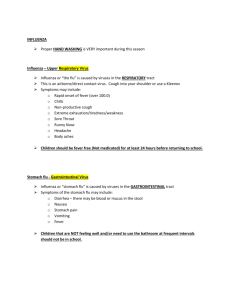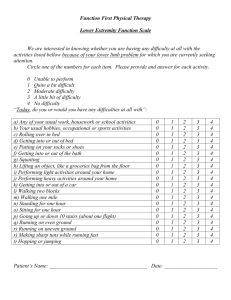NOVEL INFLUENZA A H1N1 (Swine Flu)
advertisement
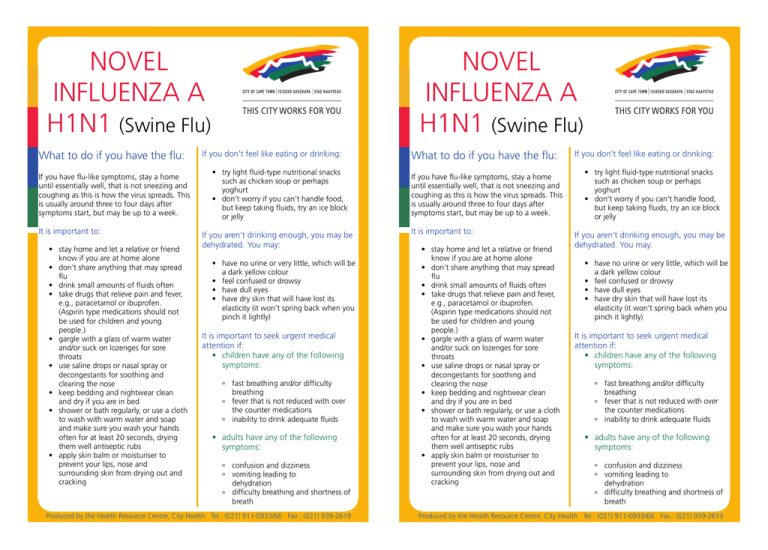
NOVEL INFLUENZA A H1N1 (Swine Flu) NOVEL INFLUENZA A H1N1 (Swine Flu) What to do if you have the flu: If you have flu-like symptoms, stay a home until essentially well, that is not sneezing and coughing as this is how the virus spreads. This is usually around three to four days after symptoms start, but may be up to a week. It is important to: • stay home and let a relative or friend know if you are at home alone • don’t share anything that may spread flu • drink small amounts of fluids often • take drugs that relieve pain and fever, e.g., paracetamol or ibuprofen. (Aspirin type medications should not be used for children and young people.) • gargle with a glass of warm water and/or suck on lozenges for sore throats • use saline drops or nasal spray or decongestants for soothing and clearing the nose • keep bedding and nightwear clean and dry if you are in bed • shower or bath regularly, or use a cloth to wash with warm water and soap and make sure you wash your hands often for at least 20 seconds, drying them well antiseptic rubs • apply skin balm or moisturiser to prevent your lips, nose and surrounding skin from drying out and cracking If you don’t feel like eating or drinking: • try light fluid-type nutritional snacks such as chicken soup or perhaps yoghurt • don’t worry if you can’t handle food, but keep taking fluids, try an ice block or jelly If you aren’t drinking enough, you may be dehydrated. You may: • have no urine or very little, which will be a dark yellow colour • feel confused or drowsy • have dull eyes • have dry skin that will have lost its elasticity (it won’t spring back when you pinch it lightly) It is important to seek urgent medical attention if: • children have any of the following symptoms: ° fast breathing and/or difficulty breathing ° fever that is not reduced with over the counter medications ° inability to drink adequate fluids • adults have any of the following symptoms: ° confusion and dizziness ° vomiting leading to dehydration ° difficulty breathing and shortness of breath Produced by the Health Resource Centre, City Health Tel.: (021) 911-0933/66 Fax.: (021) 939-2619 What to do if you have the flu: If you have flu-like symptoms, stay a home until essentially well, that is not sneezing and coughing as this is how the virus spreads. This is usually around three to four days after symptoms start, but may be up to a week. It is important to: • stay home and let a relative or friend know if you are at home alone • don’t share anything that may spread flu • drink small amounts of fluids often • take drugs that relieve pain and fever, e.g., paracetamol or ibuprofen. (Aspirin type medications should not be used for children and young people.) • gargle with a glass of warm water and/or suck on lozenges for sore throats • use saline drops or nasal spray or decongestants for soothing and clearing the nose • keep bedding and nightwear clean and dry if you are in bed • shower or bath regularly, or use a cloth to wash with warm water and soap and make sure you wash your hands often for at least 20 seconds, drying them well antiseptic rubs • apply skin balm or moisturiser to prevent your lips, nose and surrounding skin from drying out and cracking If you don’t feel like eating or drinking: • try light fluid-type nutritional snacks such as chicken soup or perhaps yoghurt • don’t worry if you can’t handle food, but keep taking fluids, try an ice block or jelly If you aren’t drinking enough, you may be dehydrated. You may: • have no urine or very little, which will be a dark yellow colour • feel confused or drowsy • have dull eyes • have dry skin that will have lost its elasticity (it won’t spring back when you pinch it lightly) It is important to seek urgent medical attention if: • children have any of the following symptoms: ° fast breathing and/or difficulty breathing ° fever that is not reduced with over the counter medications ° inability to drink adequate fluids • adults have any of the following symptoms: ° confusion and dizziness ° vomiting leading to dehydration ° difficulty breathing and shortness of breath Produced by the Health Resource Centre, City Health Tel.: (021) 911-0933/66 Fax.: (021) 939-2619 NOVEL INFLUENZA A (H1N1) (Swine Flu) Fever SYMPTOM or SIGN Usual and can be severe Usual and can be severe Usual and can last 2-3 weeks or more after the actual illness Usual, early onset can be severe In children less than 5 years old Rare Rare Rare Rare Usual Usual Usual, sudden onset, 38°C-40°C and lasts 3-4 days Rare INFLUENZA Usual Is it a cold or the flu? Healdache Aches and pains Nausea, vomiting, diarrhoea Fatigue and weakness Debilitating fatigue Watering of the eyes Runny, stuffy nose Rare in early stages Sometimes, but mild to moderate COMMON COLD Sneezing Usual and can be severe Rare Rare Sometimes, but mild Chest discomfort NOVEL INFLUENZA A (H1N1) (Swine Flu) Fever SYMPTOM or SIGN Usual and can be severe Usual and can be severe Usual and can last 2-3 weeks or more after the actual illness Usual, early onset can be severe In children less than 5 years old Rare Rare Rare Rare Usual Usual Usual, sudden onset, 38°C-40°C and lasts 3-4 days Rare INFLUENZA Usual Is it a cold or the flu? Healdache Aches and pains Nausea, vomiting, diarrhoea Fatigue and weakness Debilitating fatigue Watering of the eyes Runny, stuffy nose Rare in early stages Sometimes, but mild to moderate COMMON COLD Sneezing Usual and can be severe Rare Rare Sometimes, but mild Chest discomfort
